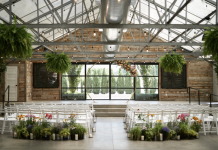It’s 2022 and, gratefully, most of the cancellations, adjustments and compromises engaged couples were forced to make in 2020 are in the rearview mirror, right? Well, maybe not. The pandemic year pause triggered a nuptial wave that, according to the market research firm The Wedding Report, is just now peaking: 1.9 million couples married in 2021, 2.5 million couples are planning to tie the knot this year—the most the U.S. has seen since 1984—and 2.24 more will wed in 2023. (For context, 2.1 million weddings were held in both 2018 and 2019.) In short, the intense demand for venues and services, combined with labor shortages and broken supply chains, have thrown typical wedding planning timelines and processes out the window.
All that said, couples can still have the wedding of their dreams, as long as they are willing to make decisions quickly, be less specific and, most importantly, have patience. So says three of Utah’s top wedding planners: Michelle Cousins with Michelle Leo Events, Fuse Weddings & Events’ Mara Mazdzer and Tonya Hoopes of Hoopes Events.

Choosing a wedding date other than a Saturday—particularly in June, July or August—is a piece of advice echoed by all three of these planners. “Most of those coveted weekend dates are already booked into 2023,” Cousins says. “By looking at a midweek date or even a Sunday, couples are more likely to be able to have that summer wedding they want. Or think about having a fall wedding—Utah is gorgeous in September and October.”
Once you’ve landed on a date and a venue, line up and sign vendors as quickly as possible. “To use a football analogy,” Mazdzer says, “you need to get all your players—the caterer, florist, photographer, band or DJ, etc.—on the bench and then we can figure out the plays, or the details, later. In this high-demand climate, if you hesitate just a few days, then those vendors get booked by someone else.”

Supply chain interruptions have hit florists particularly hard. When considering flowers, avoid focusing on specific species. “In this post-COVID world, sometimes floral shipments don’t arrive on time, or at all, to the wholesalers,” Hoopes says. “When interviewing a florist, ask how they handle substitutions. Ask them about alternates in the same color and texture of your first choice that will work with other flowers being used.”

Lastly, hire a wedding planner. Wedding planning is stressful under normal circumstances, and, when taking all the current challenges into consideration, it can be downright frustrating. “We have established relationships with venue managers and vendors and can land bookings much more efficiently than couples can on their own,” Cousins says. “But couples should know that this is a very unusual time. It took superhuman perseverance for the wedding industry across the country to pull off 2021, and we’re expecting to be even busier this year. We are here to help. We just ask for a little patience. And, please, be nice.
Featured image by Elisha Braithwaite
Read more features from our 2022 issue here!




